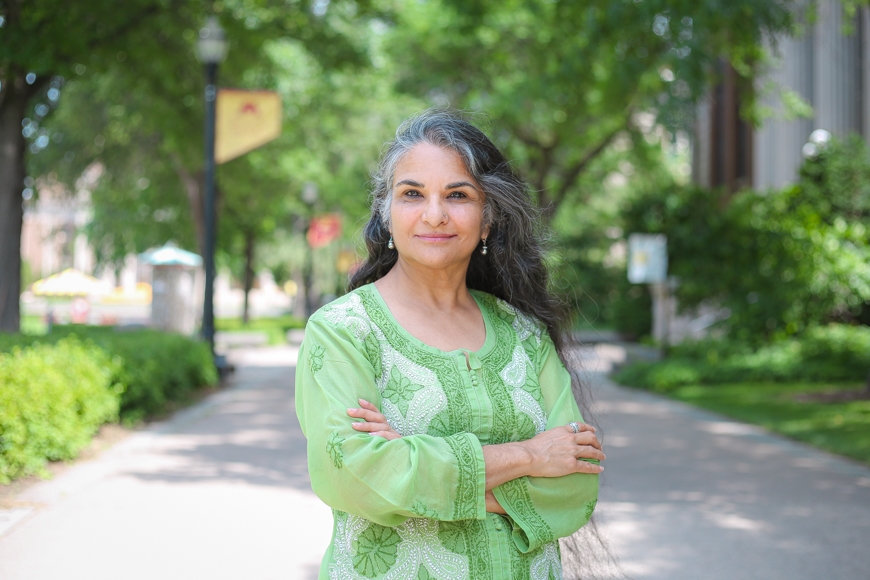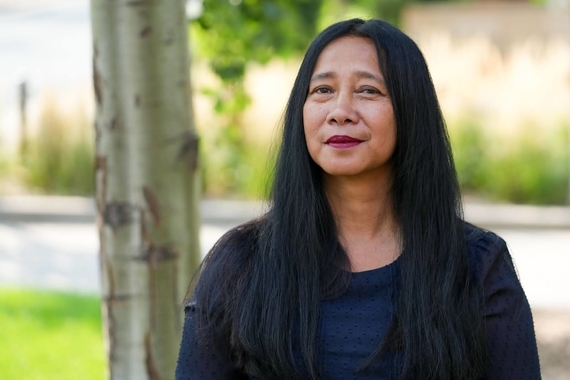Seeding Change and Seeing Change: The Enduring Legacy of Richa Nagar
Professor Richa Nagar first arrived at the University of Minnesota in 1989, weeks before turning 21. Having left Lucknow (India) in pursuit of a PhD in geography, Nagar was one of eleven fellows in the inaugural year of the MacArthur Program on International Peace and Cooperation (now the Interdisciplinary Center for the Study of Global Change). Looking back on her early years at the University of Minnesota, Nagar fondly recalls the sense of community and the intellectual vibrancy that defined her experiences.
“The memories that gush in are those of building family with peers—practically living in the Wilson Library, having passionate political arguments without fear, sharing stories of the homes, streets, and political cultures that molded us,” she reminisces. These experiences, she notes, were pivotal in shaping her academic career and inspiring her lifelong commitment to social justice and transnational solidarity.
A Journey Through Academia
Having arrived at the University in 1989, a time of much political unrest around the world, Nagar found herself in a unique transnational community. “Students from Africa, Asia, and the Americas came together with faculty to build rigorous anti-disciplinary reflections on colonialism, postcolonialism, and struggles against oppression,” she reflects. This rich environment, nurtured by staff, fostered in Nagar a great attachment to UMN. It was “the magic of this education” that prompted her doctoral research on the politics of gender, race, religion, and caste among South Asian communities in Tanzania.
In May 1995, Nagar became the first fellow of UMN’s MacArthur program to successfully defend her PhD. Having grown attached to UMN, she left her tenure-track job in geography at CU-Boulder, and returned to the Twin Cities as a faculty member in what was the Department of Women’s Studies in 1997. This allowed her to grow the seeds of commitments she had planted during her time as a student, building and sustaining “strong learning and mutually caring communities—locally, nationally, and transnationally.” Nagar also served as CLA’s associate dean for faculty from 2008 to 2011, after her outstanding faculty achievements had been recognized through such awards as a McKnight Land Grant Professorship, a McKnight Presidential Fellowship, and a CLA Scholar of the College Award.
“Over the last 27 academic years since my hire, I have formed partnerships with faculty, students, and staff in many units across colleges,” she says, highlighting her multidisciplinary impact.
Challenges in the Academic World
Navigating the world of knowledge production in a way that refuses the borders among academia, arts, and activism has not been without its challenges. One significant hurdle came in the form of hostility towards her collaborative, multilingual, and anti-disciplinary work that has involved movement building with grassroots activists and artists in the global south. “Such work contradicts a fundamental investment of dominant knowledge systems in creating individual experts and universal truths,” she explains. Overcoming these obstacles required embracing humility and continuously learning from and surrendering to the journey, which includes both victories and mistakes. Nagar’s ability to transform these challenges into opportunities for deeper collaboration and engagement serves as a testament to her resilience and dedication in search of sociopolitical, poetic, and epistemic justice.
Additionally, an attack on Sangtin Yatra, a book in Hindustani that she co-wrote between 2002 and 2004 with eight grassroots activists of the Sangtin women’s collective in North India, was a politically charged moment that tested her resolve and marked a key milestone in her career. Functioning as a catalyst for “significant political and intellectual battles,” this radical collaboration also resulted in Nagar’s widely read and translated book with Sangtin Writers, Playing with Fire, in 2006. Following this, Nagar has authored or edited nine books, including the award-winning works Muddying the Waters (2014) and Hungry Translations (2019), both of which are in conversation with the grassroots movement building that emerged after Sangtin Yatra/ Playing with Fire.
Collectively Questioning the Definition of the Margins
A cornerstone of Nagar’s work has been questioning the definition of who and what forms the margins, and exploring how what is seen as marginal can in fact destabilize the center. Her central involvement in AGITATE! Unsettling Knowledges, an open-access, open-genre, multilingual journal that she co-founded with a group of former graduate students at UMN, exemplifies her commitment to this cause. “Through AGITATE!, we have been able to create an ever-growing, ever-deepening family of co-agitators across the world, seeding hope in hard-earned collectivity during times when it is desperately needed,” she states. The journal has provided perspectives often excluded from mainstream academic discourse, fostering a space for reflection, analysis, community, and healing. “At a time when COVID lockdown had paralyzed so many academics, AGITATE! was able to plant dreams and nourish connections,” Nagar says.
Nagar’s teaching philosophy, which emphasizes the importance of humility, co-dreaming, and collective growth, further underscores her dedication to empowering her students. “I try to communicate to my students: I know that each one of you is brilliant, and I will never ask you to compete with one another to prove your brilliance. What I want to see is how generously you can learn and grow with one another in our journey as a class,” she shares. Nagar acknowledges that this approach is not always easy, yet this core commitment has deeply influenced much of what she embraces in all aspects of her life.
“I never cease to see the transformative possibilities of this embrace.”
A Legacy Worth Honoring
The legacy that Nagar hopes to leave behind is one of tireless dedication to justice and collective agitation for change. “My advice to young scholars and activists would be this: Never cease to believe in the precious lessons you carry—from the worlds that have formed you; from the languages, knowledges, and imaginations that you bring from the journeys and people that ground you in your soil. Name those connections and learnings; nourish, critique, and hone them,” she says. “So that you can create your own praxis of mobilizing against injustice and violence and to continuously strive for liberation and truth.”
As Nagar retires from the University of Minnesota as Professor Emerita and transitions into her new role as the inaugural Gloria Steinem ’56 Endowed Chair in Gender and Women’s Studies at Smith College, she recognizes the bittersweet reality of leaving a place that has long felt like home. “When you’ve been home in a place for all your adult life, then that place, its people, and their ways all become an essential part of you. UMN is that place for me. It has served as a foundation as well as a fountain that I could count on for thirty-five years. I will miss that home, I will miss the UMN students who have taught me so much, I will miss my colleagues—the faculty and staff with whom I have closely worked and made things happen.”
“I wish to express my deepest gratitude and sincere appreciation to everyone who has supported and shaped the many collaborative dreams and journeys that have given meaning to my work and life since 1989,” Nagar states. “Your support made it possible to repeatedly realize things that were deemed impossible through the academy.”
As she embarks on this new chapter at Smith College, Nagar leaves behind a legacy of unwavering dedication to justice and social change and an impact that is deeply felt by the UMN community.
Honoring Excellence
“Each award and recognition has been meaningful, no matter how big or small in the eyes of the world,” Nagar states. Throughout her illustrious career, Nagar has received numerous awards and recognitions that underscore her significant contributions to her field, including:
- MacArthur Scholar at UMN, 1989–95
- McKnight Land-Grant Professorship, 2000–02
- McKnight Presidential Fellowship, 2002–05
- Residential Fellowship, Center for Advanced Study in the Behavioral Sciences (CASBS), Stanford, 2005–06
- CLA Scholar of the College Award, 2008–11
- Professor of the College (with Russell M. and Elizabeth M. Bennett Chair in Excellence & Beverly and Richard Fink Professorship in Liberal Arts), 2015-retirement
- James Blaut Award for Socialist and Critical Geography, American Association of Geographers, 2019
- Global Development Studies Book Award, the International Studies Association, 2021
These and many other accolades have energized and inspired her ongoing commitment to her work.
This story was written by Regina Ramos-Francia Ylizaliturri, an undergraduate student in CLA.



